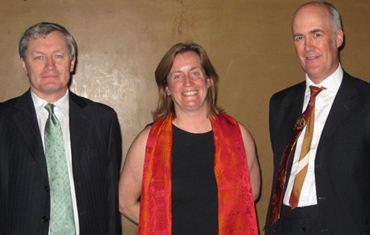
NEWS
AHRC Launches 5.5 million pound programme, Beyond Text: Performances, Sounds, Images, Objects
30 June 2008
 The Arts and Humanities Research Council is launching one of its major strategic programmes on Monday, 30 June at the Truman Brewery, London: Beyond Text: Performances, Sounds, Images, Objects.The Programme Director, Professor Evelyn Welch, Queen Mary University of London and Dr Charles Saumarez -Smith of the Royal Academy will introduce and explain the importance of this substantial investment in arts and humanities research.
The Arts and Humanities Research Council is launching one of its major strategic programmes on Monday, 30 June at the Truman Brewery, London: Beyond Text: Performances, Sounds, Images, Objects.The Programme Director, Professor Evelyn Welch, Queen Mary University of London and Dr Charles Saumarez -Smith of the Royal Academy will introduce and explain the importance of this substantial investment in arts and humanities research.
AHRC Director Philip Esler, Professor Evelyn Welch and Dr Charles Saumarez -Smith
Beyond Text grew out of a recognition that today's digital culture means that communication is more rapid and often more transitory than ever before; performances, sounds, images and objects circulate swiftly on a global scale only to be replaced by even newer versions. Who controls and manages this material and its dissemination is now a key political, economic and legal question. Yet these are not new problems but ones with long historical roots.
Beyond Text addresses key issues of how people and societies communicate without using the written word - how we learn from watching and imitating others, - how we learn from images and objects - how and why we respond to performance, sound and place. What should we be preserving from our past and what should we simply let go?
The programme, two years in the making, has just funded 6 PhD studentships where students will work with institutions as diverse as the National Libraries of Scotland, the Art Fund and the White Cube Gallery, London. One student will be comparing 18th century correspondence (where men and women wrote to each other many times a day) with contemporary blogging practices to ask what has changed? Another student will be using the latest eye-tracking technology to observe how visitors actually observe art works when they enter a museum or gallery.
The programme has also funded 15 networks and workshops to bring together groups of academics, artists and others to develop high-risk, innovative ideas and methods. A group of lawyers from the University of Edinburgh will be working with dancers to identify the point when 'originality' occurs and ask if our current copyright legislation is still workable. Experts from Turkey, Georgia and the UK will come to the Courtauld Institute, London to compare how inscriptions become artworks in medieval Islam and Byzantium, a topic of considerable relevance today when figurative images can be so problematic for some religions. A network of specialists are working with theatre groups to explore how disability history can be performed and preserved. Another group based at the Oxford Brookes University is questioning our current fears about rowdy public behaviour by looking at similar issues in the 16th century.
The programme will fund a further series of large and small projects in 2009 and will deliver the results of its research with a major festival in 2012.